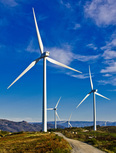

|
|
 Wind farms won all the contracts in Brazil's November 18, 2013 A-3 auction for new power capacity. Developers of thirty-nine contracted projects will install 868 MW of capacity and sell energy at an average price of 124.43 reais ($54.87) a megawatt-hour, according to EPE. Wind, solar, small hydro, and biomass competed in the auction. Brazil is on track to auction more than 3,000 megawatts of wind in 2013, the most ever, Elbia Melo, president of the wind energy trade group Associacao Brasileira de Energia Eolica (ABEEólica), told Bloomberg. That will benefit turbine suppliers including France’s Alstom SA (ALO) and Spain’s Acciona SA that are investing in factories to meet a local-content requirement.
Brazil: Industry Consortium Proposes Three Solar Only Auctions of 500MW each in 2014, 2015, and 201611/12/2013
 Three Brazilian industry associations, The Brazilian Association of Independent Power Producers (APINE), the Industry Association of Cogeneration (COGEN), and the Brazilian Electrical and Electronics Industry Association (ABINEE), are preparing to send the government a proposal for solar only auctions. The three 500MW auctions will be held in 2014, 2015, and 2016, according to COGEN. Solar energy would be supplied for 25 years starting in 2016. As reported in PV-Tech, executive vice president of COGEN, Leonardo Calabró, said a reasonable price for the auction to offer is BRL190 (US$83) to BRL200 (US$87), per MWh, as solar is not yet competitive with wind and other energy sources in Brazil. He said it was therefore unfair for solar to compete in this year's A-3 and A-5 energy auctions; the first national auctions open to include solar projects. The proposed plan also includes two auctions for other renewable energy projects, in 2015 and 2016, which could expand to include biomass, wind and hydro.  Pedro Joaquín Coldwell, the head of Mexico's energy ministry Sener, this week in Cancún laid out five reforms to promote renewable power in Mexico. 1) Create an independent system operator that manages expansion of the transmission network and all interconnection permits. 2) Facilitate the sale of renewable power through creation of a regulated wholesale generation market. 3) Develop mechanisms for distributed generation projects, which is still unknown territory in Mexico. 4) Create demand for renewable energy through stronger implementation of renewable goals and stimulate cheap renewable energy financing. 5) Establish regulation for public consultations on renewable projects to ensure inclusiveness in communities and mitigate negative externalities of projects. For more see BN Americas (subscription required).  In an extensive article, the Washington Post reports: "Though hydropower, which generates the vast majority of electricity, will remain vital, the government’s energy planners say that by 2025, dam building may be tapped out as a viable alternative. Projects like Belo Monte — a gargantuan dam whose construction has generated relentless protests by environmentalists and Indians — appear to be a thing of the past. Instead, the Energy Ministry wants wind and biomass, which here means sugar-cane waste, to provide 30 percent of new electricity generation."  Enel Green Power, controlled by Italy's Enel, Europe's No. 2 utility, is shifting more of its investments away from Italy and Spain to emerging economies, according to Reuters. In Latin America, Enel's Spanish unit Endesa is seeking to develop 700 megawatts of renewable capacity in Brazil and 500 megawatts in Chile by 2017. |
Categories
All
Archives
January 2025
Blogroll
|
|
© 2013 - 2025 InterAmerican Clean Energy Institute, a project of Earth Ways Foundation Inc, a 501(c)3 nonprofit organization.
|
Web Hosting by iPage
|
 RSS Feed
RSS Feed